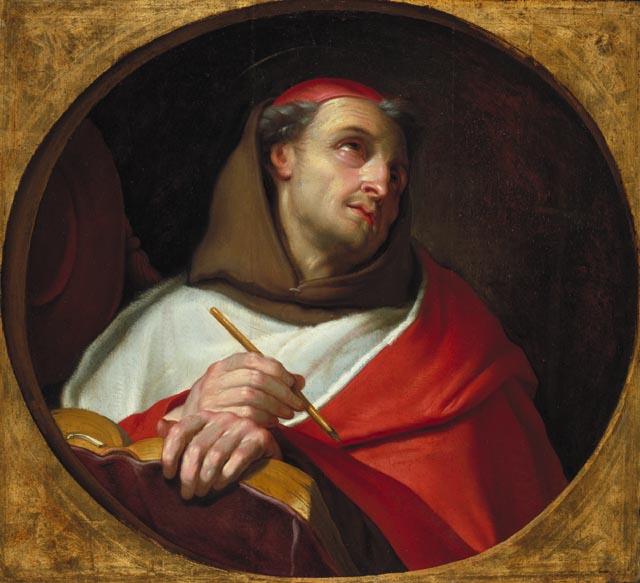Ever since the great Thomist revival of the 19th century many Catholics have forgotten about St. Bonaventure and honored only St. Thomas. Before investigating the merits of St. Bonaventure I will say nonetheless that, as the tradition of the Church demonstrates ever since his death, St. Thomas is a truly marvelous expositor of Christian philosophy and doctrine whose teachings are to be seen as the clearest guides to the truth in a confused world (although there are other church doctors, like Bonaventure, who fulfill the same task but in a perhaps less effective way). However, contrary to popular belief, even the encyclical which started the revival, Aeterni Patris, praised both the philosophies of St. Thomas and St. Bonaventure. In their encyclicals, the popes frequently quote their predecessors and Leo XIII was no exception. Indeed, he quotes the wonderful papal bull, Triumphantis Hierusalem, a bull written by Sixtus V to proclaim St. Bonaventure as a doctor of the church. Perhaps the most interesting passage in the speech is the one where Sixtus V calls St. Bonaventure the equal of St. Thomas and honors them both as teachers of truth against error:
For these “are the two olive trees and two candlesticks” lighting the house of God, who both with the fat of charity and the light of science entirely illumine the whole Church; these two by the singular providence of God appeared at the same time rising forth as two stars from the brightest families of model Orders, which have always been prepared as things most useful to holy Church in defending the Catholic religion, and in undertaking all labors and dangers for the orthodox faith, from which, as from a fertile and well cultivated soil, daily by the grace of God fecund and fruitful plants are procreated, by this is meant those men outstanding in doctrine and sanctity, who energetically conduct the strong and faithful work of the bark of Peter, driven about by so many waves, and of the Roman Pontiff, holding (as he does) his key not without the greatest sollicitude.
Thus we see that the Church has always honored St. Bonaventure highly and it is truly an anomaly that the Thomist revival seems to have so totally ignored this great saint.
Yet what does St. Bonaventure offer that St. Thomas does not? Historian Charles Coulombe has said some clarifying things about this matter. Back in the days of medieval scholasticism the different schools balanced out the excesses of one another. St. Thomas, for all his worth, seems to have been too drawn toward the philosophy of Aristotle, which has materialistic aspects. St. Bonaventure, on the other hand, was more focused on the spiritual. A truly commendable aspect of St. Bonaventure’s thought is his high view of revelation. For St. Bonaventure a philosophy simply cannot be true if it does not take into account the fundamental aspects of reality which have been revealed to us by God: the incarnation, the trinity, the nature of the soul. As with St. Thomas, he holds that the philosophies of the Greeks used reason to know some of these truths but, unlike St. Thomas, he holds that a true philosophy will always need to have Christ as its ultimate focus and not depend on pagan wisdom–which could only glimpse the truths of revelation in part. In my view, this particular aspect of St. Bonaventure is superior to St. Thomas since it avoids some of the rationalistic excesses of Thomism. Together, as Sixtus V proclaims, both St. Thomas and St. Bonaventure can offer a balanced presentation of ancient truths to the modern world.
One of the rather tragic aspects of the post Vatican II era is that many philosophers have ignored St. Thomas and, rather than spend more time focusing on the more Platonic tradition in Catholic philosophy, have replaced the wisdom of St. Thomas with the confused errors of modern philosophy.


Leave a Reply